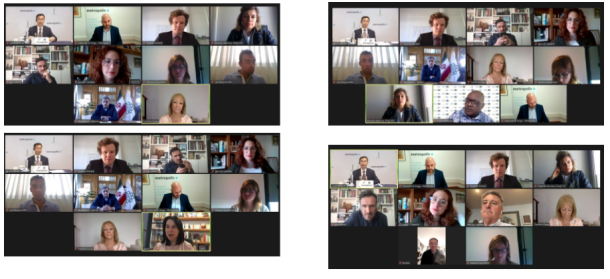
Metropolis leaders call for more equal, sustainable and healthy metropolitan spaces
The first Executive Committee meeting of the 2021-2023 mandate took place on 30 March and brought together mayors representing the Metropolis Co-Presidencies and representatives from the Treasury. The meeting aimed to explore the priorities of each co-president's portfolio and the goals of Metropolis Women in order to identify key points and contributions to develop the Metropolis Strategic Action Plan, as well as proposals for action. The meeting was held virtually and chaired by Wen Guohui, Mayor of Guangzhou and President of Metropolis.
“Metropolis must fully leverage its unique strength to unite our political leaders, policymakers and practitioners worldwide to make the voices of its members heard”, Wen Guohui
Guohui opened the meeting by sharing Guangzhou’s response to Covid-19 and the latest update on the city’s economic and social development. He stated that, as a network, “Metropolis must fully leverage its unique strength to unite our political leaders, policymakers and practitioners worldwide to make the voices of its members heard.”
During the interactive presentations, the Executive Committee had the chance to share political insights from their respective portfolios. Carolina Cosse, Mayor of Montevideo, kicked off the round of presentations, and her speech highlighted the importance of the key role that metropolises have to play, especially in the context of the Covid-19 pandemic. Her portfolio focused on the double impact the pandemic has had on “Finance”: today local governments have lower incomes and higher expenses. She stressed that new means of innovative and adaptive funding are now required in order to tackle the challenges ahead. Finally, she concluded that some answers could be found in smart solutions, and a new set of services should be sought to bridge the digital and cultural gap.
“Social cohesion” was the portfolio presented by David Makhura, Premier of Gauteng Province. He highlighted how social exclusion is one of the issues faced by all local governments. Makhura stated that building social cohesion is key in allowing inclusive participation to shape social, economic and political institutions and their outcomes on any given society, regardless of any inherent differences. He went on to add that Covid-19 has exacerbated exclusion and inequality in societies worldwide, jeopardising access to basic services. The Gauteng province will therefore be reporting on social exclusion to the Metropolis community, as he believes that all local governments should work towards social cohesion.
The next discussion was led by Laura Pérez, Councillor for Feminism and LGTBI at Barcelona City Council and President of Metropolis Women. Pérez highlighted that, despite the great achievements of gender mainstreaming across all the actions in the network, there is still a lot to do. The current pandemic has amplified and accelerated pre-existing tensions and inequality, particularly for women. For the next three-year mandate, the work of Metropolis Women will address the following critical challenges: improving public space, resilience, public governance and the digital gender gap. For all these issues, the gender perspective will be a crucial factor in building innovative and effective metropolitan solutions.
“Climate change with a focus on ecological transition” was the topic chosen by the Barcelona Metropolitan Area (AMB), represented by Elisenda Alamany, Municipal Councillor at AMB. She highlighted that, despite its devastating effects, the pandemic also represents an opportunity to renew and modernise political agendas. As an example, she explained how public space and climate agendas are fundamental in fighting inequality and to transform metropolitan areas into fairer, more equitable and healthier cities. Alamany highlighted that it is time to cooperate and see metropolitan areas as spaces for collaboration, helping the metropolises that are most in need.
A new Co-Presidency joined this mandate, the City of Tehran, represented at the meeting by the Mayor of Tehran, Pirouz Hanachi. Tehran’s portfolio presented the subject of “Architecture and urban regeneration” linked to resilience. Mayor Pirouz Hanachi underlined that this topic can be used as a tool in Tehran to turn dysfunctional spaces into a more resilient urban fabric. This urban regeneration process, he claimed, “aims to achieve resilience by preserving and reviving the natural and historical identity of the city, allowing it to become a global city that can communicate worldwide and exchange knowledge.”
"It is important to take definitive action on mobility, which allows us to lower gas emissions significantly”, Valerie Plante
“Nature, biodiversity and mobility” were introduced by the Mayor of Montréal, Valerie Plante. She underlined the importance of “protecting our green spaces and creating new ones” in metropolises and metropolitan spaces, especially in the context of Covid-19. Plante also added that it is important “to take definitive action on mobility, which allows us to lower gas emissions significantly.”
“This platform is based on hundreds of research and case studies on sustainable development from non-Metropolis and Metropolis members”, Thomas Honeck
The city of Berlin was represented by Thomas Honeck, Head of International Networking. He introduced the “Urban sustainability development” portfolio, which will be based on the online platform USE (Urban Sustainability Exchange). “This platform is based on hundreds of research and case studies on sustainable development from non-Metropolis and Metropolis members”. Honeck underscored the importance of creating spaces for knowledge exchange during Covid times, as one-to-one meetings are highly restricted.
“There is a real need worldwide to strengthen the role and future of cities and to make them more resilient, adaptable, and smarter”, Pascal Smet
Another idea exchanged during the online gathering was that, despite the current pandemic, cities are still the future and “there is a real need worldwide to strengthen the role and future of cities and to make them more resilient, adaptable, and smarter”, stressed Pascal Smet, Secretary of State of the Brussels-Capital Region.
Finally, the meeting was also an opportunity for the President of UCLG and Mayor of Al Hoceima, Mohammed Boudra, to discuss the strategies and priorities of both organisations. He highlighted the need to strengthen collaboration and rethink regional planning to guarantee the full inclusion and participation of all citizens and create more equal societies.

